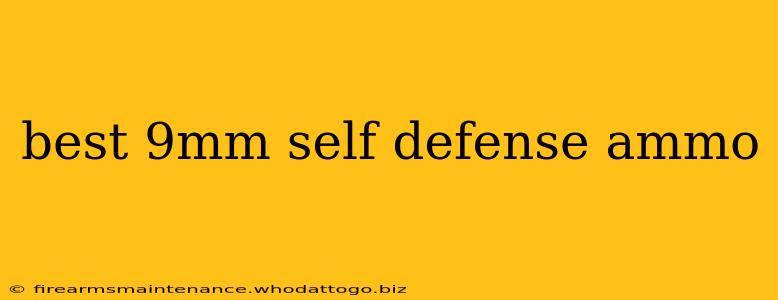Choosing the right 9mm self-defense ammo is a critical decision, impacting your safety and the effectiveness of your firearm. This isn't a choice to be taken lightly. This guide will delve into the key factors to consider when selecting ammunition, exploring different bullet types and helping you make an informed decision based on your specific needs and preferences. Remember, laws regarding ammunition vary by location, so always check your local regulations.
Understanding Key Factors in 9mm Self-Defense Ammo Selection
Several factors influence the effectiveness of 9mm self-defense ammunition. Let's break them down:
1. Bullet Type: The Heart of the Matter
The bullet itself is the most significant factor. Popular choices include:
-
Full Metal Jacket (FMJ): These bullets are completely encased in metal, offering good penetration but limited expansion. Generally, not recommended for self-defense due to their tendency to over-penetrate, posing a risk to bystanders.
-
Jacketed Hollow Point (JHP): These are the most common choice for self-defense. The hollow point design allows the bullet to expand upon impact, transferring more energy to the target and causing greater tissue damage. This increased energy transfer leads to a higher stopping power, minimizing the risk of the round passing through the target.
-
Hollow Point Variations: Within JHPs, there's considerable variety:
- Traditional JHP: These offer a balance between expansion and penetration.
- Controlled Expansion JHP: Designed to expand reliably while maintaining sufficient penetration.
- Bonded JHP: The core and jacket are bonded together to enhance expansion and penetration consistency, even in challenging conditions (like hitting bone).
-
Frangible/Defense Ammunition: These bullets are designed to break apart upon impact, minimizing the risk of over-penetration. While effective, they can be less consistent in their performance.
2. Grain Weight: Finding the Sweet Spot
The grain weight refers to the bullet's mass, typically ranging from 115 grains to 147 grains. Heavier bullets (e.g., 147 grain) generally offer greater penetration, while lighter bullets (e.g., 115 grain) tend to have higher velocity. The ideal grain weight depends on your specific firearm and intended use. Experimentation and testing are key to finding what works best for you.
3. Velocity: Speed Matters
Velocity, measured in feet per second (fps), influences the bullet's energy transfer upon impact. Higher velocity generally means more energy, but excessively high velocity can lead to over-penetration and reduced expansion. Again, balance is crucial.
4. Reliability: Consistency is King
Reliability is paramount in a self-defense situation. Choose ammunition known for consistent feeding and firing in your specific firearm. Testing different brands and types in your gun is essential to ensure reliable performance.
Top Considerations for Choosing Your 9mm Self-Defense Ammo
- Your Firearm: Different firearms perform optimally with different ammunition. Test thoroughly to ensure reliability.
- Your Training: Proper training is essential to maximize the effectiveness of any self-defense ammunition.
- Legal Considerations: Check local and state regulations regarding ammunition types and restrictions.
- Personal Preference: After rigorous testing, choose the ammo you feel most confident using.

